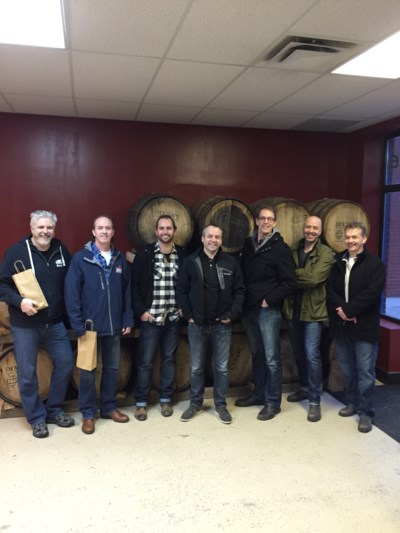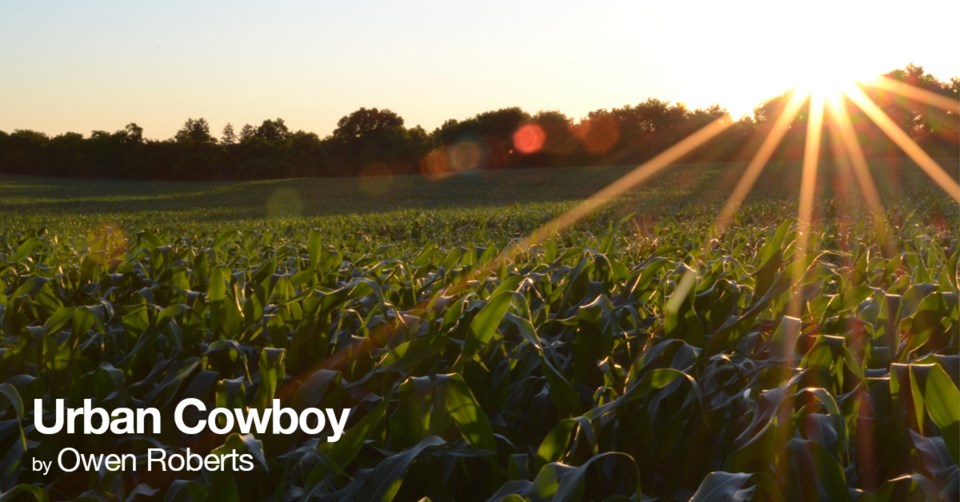Road trips don’t necessarily need a destination, or even a plan.
But they do need at least two basic ingredients: a road, and a vehicle.
 The road tripping gang at Dixon's Distilled Spirits. The groom-to-be, Dave Peleschak, is second from right.
The road tripping gang at Dixon's Distilled Spirits. The groom-to-be, Dave Peleschak, is second from right.I was fortunate recently to be part of a road trip around the Guelph area to celebrate the nuptials of my friends Dave Peleschak and Glenna Banda. Dave’s brother-in-law John Murray gathered together some buddies, lined-up a tour company with a driver and a van, and put together a full program with stops at several local breweries — including StoneHammer Brewing (formerly F&M) and Innocente Brewing Company in Waterloo — as well as Dixon’s Distilled Spirits in Guelph.
Each stop is a story in itself, and will be at some point. But today, I’m thinking about the road rather than the revelry.
Part of our trip took us down Highway 7 to Waterloo, a route of much hand wringing and gnashing of teeth for at least the past 20 years, as municipalities and the province tried to figure out if and how to widen it to accommodate increasing traffic….and of course, how to pay for it.
The Highway 7 situation is getting sorted out now, but the financial headaches that come with improving and maintaining roads is huge for all concerned.
Rural municipalities throughout Canada deal with this continually. They say the province should be more helpful with roads and bridges. After all, it’s not just rural people who use them — they serve everyone from urban people like us trekking around the county for tasting tours, to heavy transports carrying loads in and out.
Should there be a user fee to help cash-strapped rural municipalities pay for roads and bridges? Some think so…but not in the way you might imagine.
For example, in Alberta last week, agriculturally intensive Lethbridge County council approved something it calls “market access network charges” for livestock producers. The county has been toying with the idea for taxing livestock operations for road maintenance since 1998, but got tied up in red tape. Finally, it conducted a review identifying the key roads required to get farmers’ commodities to market — in other words, the market access network.
But the network is falling apart. Says the county: “The standards the network was built to in the 1960 — 1980s did not anticipate the size and volume of today’s heavy haulers.”
So now, it’s a approved a plan for farmers to a pay a road levy of $3 per head for cattle, chickens, hogs, goats and sheep raised in the county, along with a special tax on farmland and for a levy on gravel used to maintain the roads. That’s expected to raise revenue of $3.5 million a year to maintain and improve the county’s 2,000 kilometres of roads and nearly 170 bridges.
The agricultural community nationwide — already closely watching Alberta to see how it deals with mandatory farm safety legislation decreed by the provincial government last year — has a keen eye on this. The Lethbridge area, dubbed feedlot alley because of the intensive beef cattle finishing there, is indeed big user of the roads.
But it’s also a huge contributor to the economy, and to municipal infrastructure — not to the contribution it makes to our food supply. So does farming everywhere.
Is this the shape of things to come? How much of a load are we expecting farmers to bear, as they go about their jobs of feeding us? What is the responsibility of non-farmers to bear some costs, too?
It’s a delicate balance, and it’s more pertinent all the time, as we try to reach accord and harmony between rural and urban Canada, a balance some people call the social licence to farm.
Maybe somewhere people are discussing this quandary over dinner. Or over breakfast. Or on a road trip with friends, to some destination where food — and agriculture — is the focal point.
We all have a personal relationship with the farming sector, in ways we’ve likely never considered.
